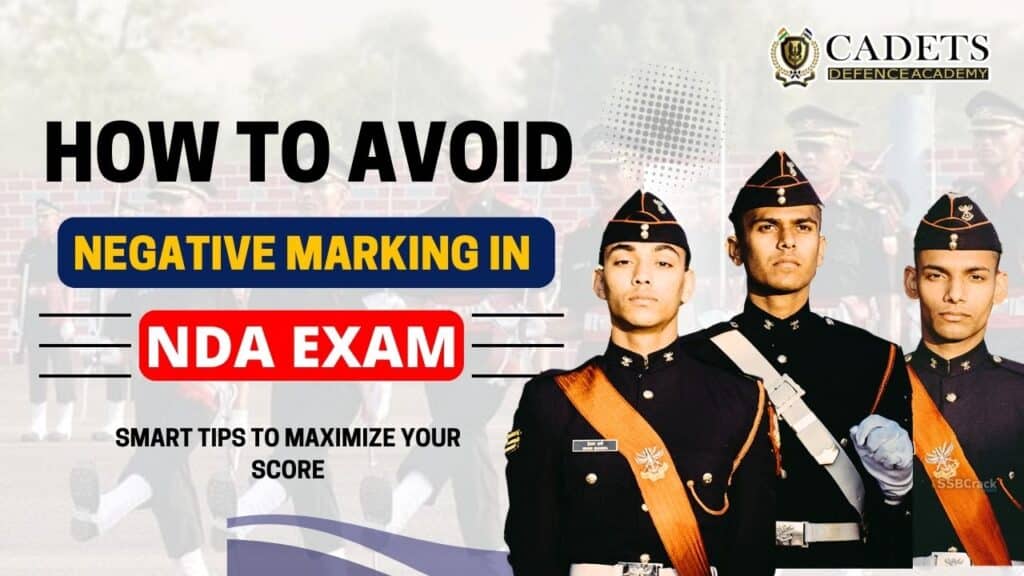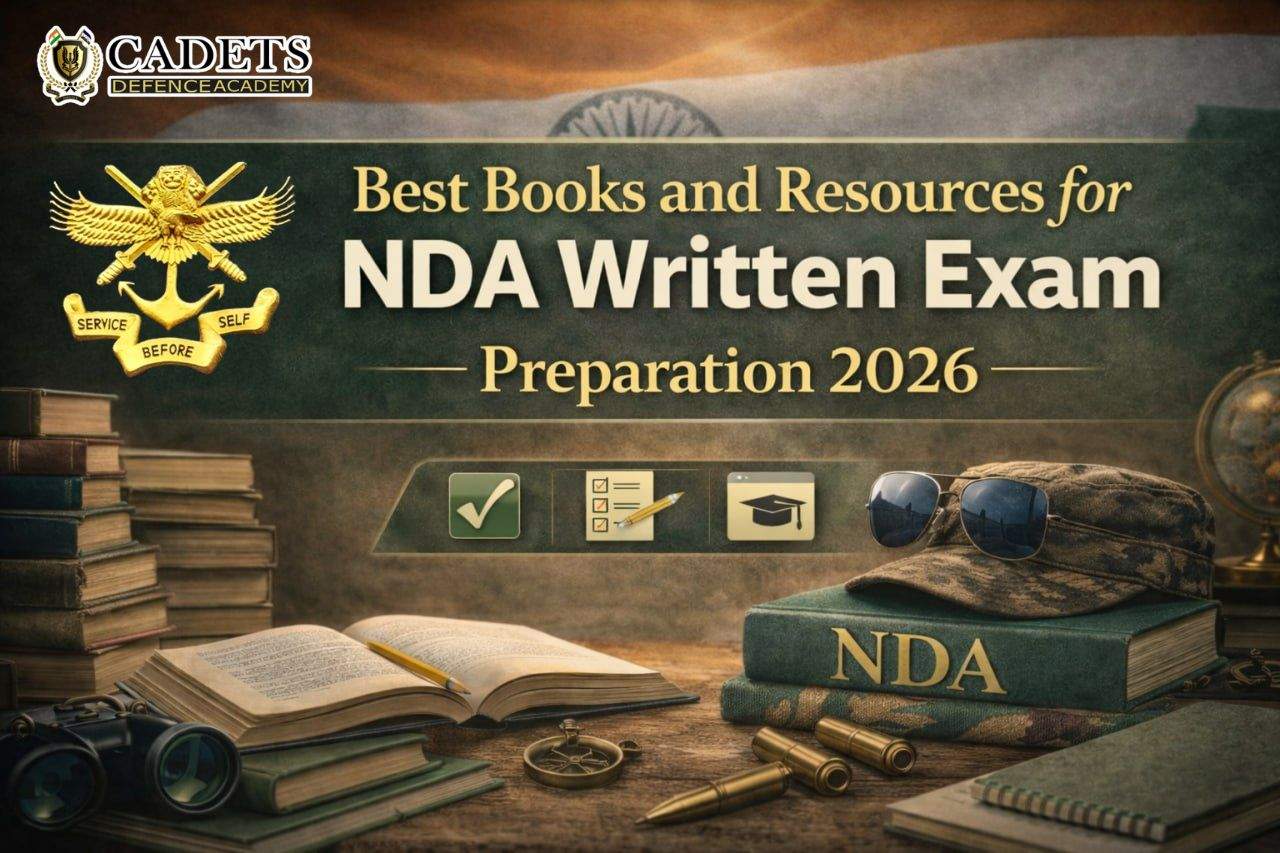15 Officer Like Qualities (OLQs): Your SSB Success Guide Table of Contents Getting that SSB call-up letter changes the game completely. You’ve already proven your intellectual might to the UPSC…
How To Avoid Negative Marking In NDA Exam: Smart Tips to Maximize Your Score
Table of Contents

“One mark can decide your destiny.” Yeah, sounds a bit dramatic—but, when it comes to competitive exams like NDA, it’s super real.
Okay, here’s the deal. You can study hard, get the formulas down, know your current affairs inside out, and still not hit the top rank… why? Negative marking. That little minus you didn’t pay attention to? It can cost you big-time. And that’s why learning how to avoid negative marking in NDA exam isn’t just helpful—it’s crucial.
In a paper where every correct answer counts and every wrong one costs you a fraction of your score, smart strategy beats blind confidence. Let’s look into, what common mistakes to avoid, and how to train your brain to dodge those negative marking like a pro.
Understanding the NDA Exam Pattern
Let’s start with the basics. If you want to clear the exam and avoid negative marking to score in thee top students the most important thing is you understand the exam.
The NDA (National Defence Academy) exam is divided into two papers:
- Mathematics – 300 marks
- General Ability Test (GAT) – 600 marks
That’s a total of 900 marks… and every mark matters.
Now, here’s where it gets interesting.
The Marking Scheme:
- Maths: +2.5 for correct answer, -0.83 for every wrong answer
- GAT: +4 for correct answer, -1.33 for wrong one
Why This Even Matters
In an exam with such fierce competition, the margin between candidates is razor-thin. One careless guess could push you below the cutoff. Not kidding. Understanding how to avoid negative marking in NDA exam isn’t just about being careful—it’s about boosting your rank.
Common Mistakes That Lead to Negative Marking
Now let’s talk about the stuff that drags people down. Not because they didn’t know the syllabus—but because they got messed up during the real exam.
- Guessing Without Elimination
Classic mistake. You don’t know the answer, but you’re like, “Eh, let me just guess. Maybe I’ll get lucky.”
Bad idea. Blind guessing is a one-way ticket to minus-town.
What you should do instead: Try to eliminate at least 2 options. If you can’t rule out anything, skip it. Seriously better to leave it blank than risking that -0.83 or -1.33
- Misreading the Question
You think it’s asking X, but it’s actually asking Y. Happens more than you’d think, especially under pressure.
Example:
Question: What is the value of sin²θ + cos²θ?
You quickly tick -1 and move on, the answer is 1. You just lost 0.83 mark and 1.33 marks if di similar mistake in GAT.
Take a breath. Read carefully and then answer the questions. Don’t just assume and don’t let excitement trick you into moving too fast.
- Panicking Under Pressure
The clock’s ticking. Your palms are sweaty. You randomly tick a few options just so the sheet doesn’t look empty. That panic costs a lot of marks to you, to avoid this.
- Practice mock tests in timed conditions — make your brain used to stress.
- Take 10 seconds to breathe and refocus when you feel the panic setting in.
- Don’t worry about how many questions you’ve left — just focus on accuracy over quantity.
- Overconfidence in “Tricky” Questions
Sometimes, a question looks easy… but it’s a trap. Especially in English comprehension or current affairs. You assume something based on what you think it means instead of reading properly, this is what we call blind guessing. Instead:
- If something feels “too easy,” it might just be wordplay. Pause and think.
- Train yourself with mock test questions that include these types of questions — get used to spotting them.
- Not Reading All the Options
Sometimes, you read option A, go “yes, that’s it,” and mark it. But then… option C was actually better.
NDA exam often throws in options that are all technically correct, but only one is the most accurate.
To avoid these type of mistakes
- Reading every option before marking your answer.
- If two options seem correct, reread the question — it’s testing your precision.
Importance of Mock Tests Practice In NDA Exam
Okay, you can’t just read theory and expect to clear the NDA exam. You need to study properly and you also have to learn how to perform under pressure. Mock tests? They’re like rehearsal for a big show. And the more you do them, the less scary the real exam feels.
When you will start taking mocks tests, you’ll realized how easily you are making silly errors—like, choosing the wrong option, or second-guessing yourself even when you are right. It’s annoying, but it’s better to screw up in practice than in the actual paper.
Here’s why mock tests matter:
- You learn time management (huge bonus).
- You build mental stamina (3 hours is not easy).
- You understand your pattern of silly mistakes and fix them.
- You learn how to avoid negative marking in NDA exam naturally—without overthinking it every time.
Also, quick tip: After every mock, go through each wrong answer. Figure out why you got it wrong. Not just what’s right. This feedback loop, it helps a lot to avoid these type of mistakes in the actual exam. You can click here to download NDA mock test pdf for free (Free NDA Mock Test 2025 : Maths & GAT Practice Question Papers with Solutions)
Revision Techniques to Strengthen Accuracy
Now comes the super useful part—revision. Let’s be honest, nobody likes revising. It’s boring. But you know what’s worse? Forgetting formulas on the exam day. Or mixing up your geography facts. Here’s how to revise smart, not just hard:
Active Recall
Close the book. Ask yourself a question. Answer it out loud. Check the answer and repeat this process this way topics stick better than passive reading.
Spaced Repetition
Don’t cram everything in one day. Space it out. Revise important stuff multiple times with gaps in between.
Error Logs
Keep a notebook where you note down your mistakes because revisiting your own mistakes makes you not repeat them.
Mind Maps & Flashcards
Sometimes a visual trick makes everything click. Mind maps help link ideas. Flashcards are good for quick facts and definitions.
These techniques don’t just help you remember stuff—they train your brain to spot and avoid traps. And, that’s another way of learning how to avoid negative marking in NDA exam without even realizing it.
Final Tips: Smart Strategy Beats Wild Guessing
Let’s wrap this up with some bonus pointers you need to keep in mind:
- Attempt the easy ones first: Boosts confidence and secures marks.
- Use elimination always: Even if you’re unsure, cutting down options increases your chances to find the correct option.
- Don’t get stuck on one question: if you feel that a particular question is taking too much time then just move on, time is precious.
- Leave blank if you’ve got no clue: It’s not worth the risk, seriously, it is better to get 0 than -0.83 or -1.33.
And most importantly—stay calm. That paper isn’t out to get you. It’s just a test. If you’ve prepared well, practiced smart, and stayed mindful, you’re already ahead of the curve.
Conclusion: Think Before You Tick
Alright, so let’s do a quick recap, of all the tips that can help you to avoid negative Marking in NDA exam
- Understand the exam pattern and marking scheme well.
- Don’t fall into the trap of blind guessing or reading questions too fast.
- Take lots of mock tests and actually analyze them.
- Revise properly—with spaced repetition, active recall, and your own error log.
- Be strategic in your attempt. Don’t let panic or overconfidence drive your answers.
Learning how to avoid negative marking in NDA exam isn’t just about dodging minus marks—it’s about building discipline, practicing mindfulness, and thinking clearly under pressure.
So next time you’re in that exam hall, staring at a question you’re not too sure about—pause. Think. Eliminate. And if needed, skip. Your future self will thank you for it.
FAQs: How To Avoid Negative Marking In NDA Exam
Negative marking is when marks get deducted for wrong answers. In NDA, every incorrect answer can cost you -0.83 marks in Maths and -1.33 marks in the GAT paper.
Best way? Don’t guess blindly. Use elimination technique, read questions carefully, stay calm, and skip questions you're totally unsure about. Also, practice lots of mock tests to train your instincts.
There’s no magic number. But focus on accuracy over quantity. It’s better to get 70 right than attempt 100 and get 30 wrong. Negative marking can cost you a lot.
Absolutely, Mocks show you where you usually mess up—silly mistakes, misreads, overconfidence, etc. Plus, they build stamina and confidence for the real exam.
It’s either panic or overconfidence. Rushing through the paper, not reading questions properly, or just guessing when you're unsure. Relax, read slow, and stay sharp.
Nope, not if you're unsure. Attempt the ones you know, guess only if you can eliminate options, and leave the rest. A blank is better than a minus.
Yeah, here’s a few:
- Don’t spend too long on tough questions.
- Double-check the option you’re marking.
- Avoid last-minute changing of answers unless you’re 100% sure.
- Stay hydrated and calm—stress makes mistakes more likely.
Reach Us
Best Books and Resources for NDA Written Exam Preparation 2026 Table of Contents Hey future warriors! If you dream of wearing that glorious uniform, you are in right place. Doing…
A Day in the Life of an NDA Cadet at Cadet Defence Academy Table of Contents Hook: Picture a 4:30 AM alarm buzzing in the pitch dark. Outside, the Dehradun…






